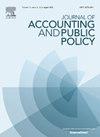Bribes and audit fees
IF 2.2
3区 管理学
Q1 BUSINESS, FINANCE
引用次数: 0
Abstract
We examine how the UK Bribery Act 2010—a law aimed at discouraging corruption—affected auditors’ fees and perceived risks associated with client firms engaging in bribery. Adopting a triple-difference design, we find that those client firms subject to the act and operating in countries perceived as more corrupt pay higher audit fees following the enactment of the act, are more likely to change auditors, and are less likely to be audited by one of the Big 4 auditors. However, we observe no significant changes for subject client firms that operate in low-corruption environments. Moreover, the act has no impact on financial reporting quality across clients. Therefore, we conclude that the increase in audit fees after the passage of the act for client firms operating in high-corruption environments is the response of auditors to the higher potential litigation and reputation costs they face when engaging with clients who are more likely to engage in bribery.
贿赂及审计费用
我们考察了2010年《英国反贿赂法》(旨在阻止受腐败影响的审计师的费用和与客户公司参与贿赂相关的感知风险)是如何实施的。采用三重差异设计,我们发现那些受该法案约束且在被认为更腐败的国家运营的客户公司在该法案颁布后支付更高的审计费用,更有可能更换审计师,并且更不可能被四大会计师事务所之一审计。然而,我们观察到在低腐败环境中运营的主体客户公司没有显著变化。此外,该法案对客户的财务报告质量没有影响。因此,我们得出结论,该法案通过后,对于在高腐败环境中运营的客户事务所,审计费用的增加是审计师在与更有可能参与贿赂的客户打交道时面临更高潜在诉讼和声誉成本的反应。
本文章由计算机程序翻译,如有差异,请以英文原文为准。
求助全文
约1分钟内获得全文
求助全文
来源期刊

Journal of Accounting and Public Policy
Multiple-
CiteScore
4.80
自引率
2.80%
发文量
75
期刊介绍:
The Journal of Accounting and Public Policy publishes research papers focusing on the intersection between accounting and public policy. Preference is given to papers illuminating through theoretical or empirical analysis, the effects of accounting on public policy and vice-versa. Subjects treated in this journal include the interface of accounting with economics, political science, sociology, or law. The Journal includes a section entitled Accounting Letters. This section publishes short research articles that should not exceed approximately 3,000 words. The objective of this section is to facilitate the rapid dissemination of important accounting research. Accordingly, articles submitted to this section will be reviewed within fours weeks of receipt, revisions will be limited to one, and publication will occur within four months of acceptance.
 求助内容:
求助内容: 应助结果提醒方式:
应助结果提醒方式:


